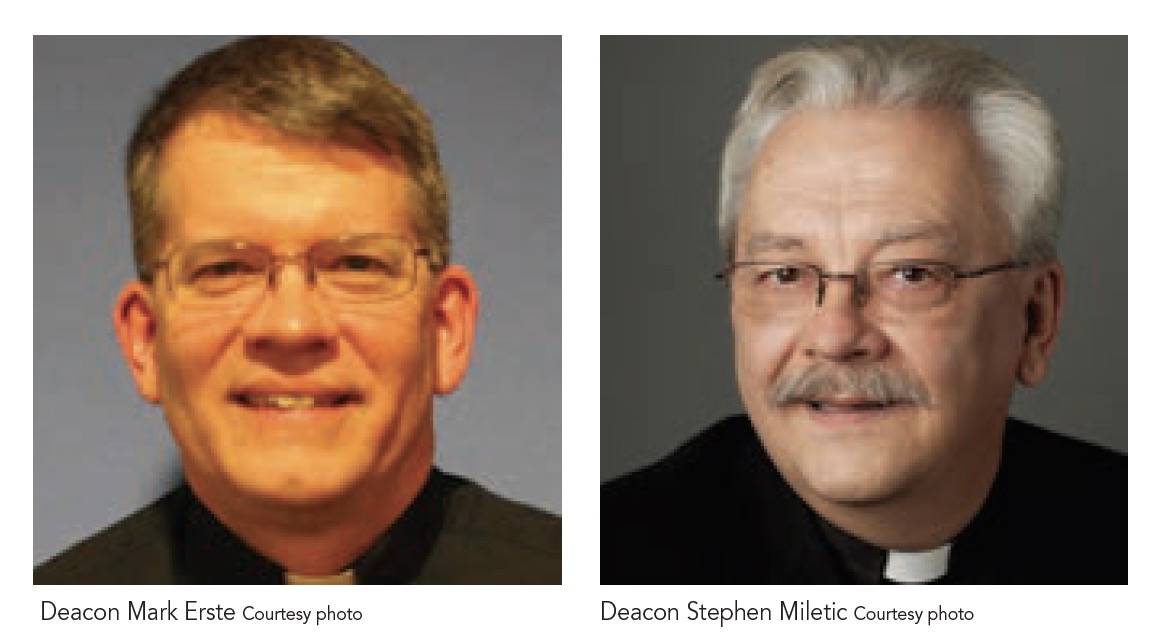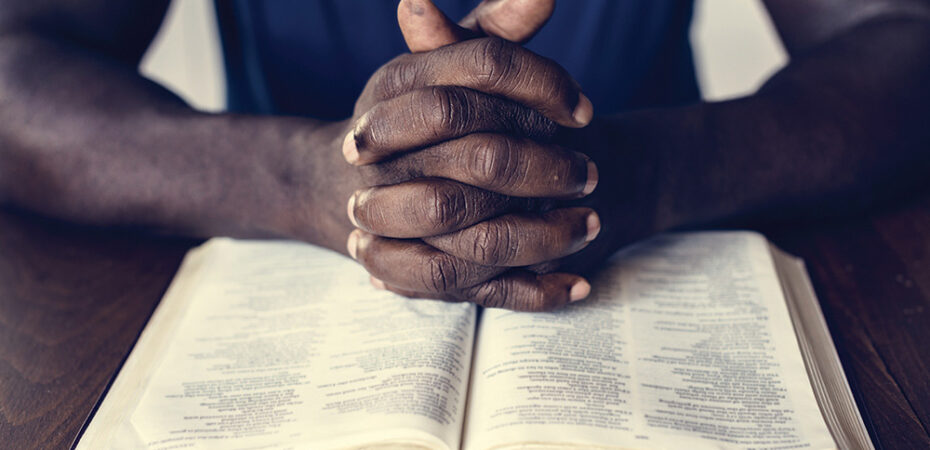New Ministry Helps Deacons Develop Interior Life
Deacon Stephen Miletic shares the importance of renewal
Tony Gutiérrez Comments Off on New Ministry Helps Deacons Develop Interior Life
Deacon Stephen Miletic recalls, as a deacon candidate, attending a lecture by a deacon discussing the importance of developing the interior life as part of the formation process. Deacon Miletic and his classmate, Deacon Mark Erste, connected with the message and asked themselves, “How come that’s not here?”
 “That’s what this is all focused on, that yearning for God. We were frustrated in our formation, that we did not see that,” Deacon Miletic told The Deacon.
“That’s what this is all focused on, that yearning for God. We were frustrated in our formation, that we did not see that,” Deacon Miletic told The Deacon.
Seeing that need, Deacon Miletic, ordained in 2012 for the Diocese of Steubenville, Ohio, and a teacher of Scripture at Franciscan University since 1996, discerned a call to, along with Deacon Erste, create the Institute of Diaconal Renewal.
The institute, based out of Franciscan University, is geared toward diocesan diaconate directors and formators, Deacon Miletic says, and is set up to offer directed retreats. The first retreat is a five-day silent retreat as an “initiation into contemplative prayer.”
“It’s a time to decompress, destress and start praying silently,” he said. “We teach how to do that with lectio divina. We teach how to recognize interior movements, affective movements, and we offer spiritual direction during the five days at least twice, more if needed.”
The second phase is a directed silent healing retreat, he said, to help the deacons address their wounds and meet with therapists, if necessary.
“When you spend enough time in silence before the Lord, you begin to notice there are impediments: unconfessed sin, painful memories where there’s a need for healing or interior healing, or maybe even deliverance,” said Deacon Miletic. “It’s scary to go silent and deep, because then you meet all the scars of your soul. And there’s where Jesus wants to meet you, that’s the real you.”
A third phase of the institute’s process would be a “formation retreat,” he said. The retreats would be two weeks each for three summers and participants would receive a certificate in formation. Other future endeavors include seminars covering topics such as the scriptural roots of the diaconate.
Deacon Miletic went into more detail with The Deacon about the Institute of Diaconal Renewal.
The Deacon: What need is the Institute of Diaconal Renewal filling?
Deacon Stephen Miletic: The Church has made great strides in forming deacons from its initial reinstatement after Vatican II. But, when you look around, the formation has another need that hasn’t been addressed intentionally, and that need is for the spiritual renewal of the deacon or the candidate to a deeper prayer life as a response to this yearning that all humans carry, which is intimacy with God.
The primacy is to develop and cultivate the interior life so that we grow as humans, we mature emotionally, and we go deeper [toward] ongoing discipleship and conversion in Christ. We have to go deeper into those gifts that God gives us so that our desire is to meet the poor and bring Christ the Servant to them.
The deacon is a missionary. There’s a certain uniqueness to the ordained quality that makes that identity different than it would be for a layman being out in the marketplace — you were ordained to do that.
He’s an emissary. A deacon is now taking on a public role of being a public sign of Christ the Servant present among you. You’re carrying Christ because you’ve been changed first in your mode of existence. You’ve been given — as a deacon — a special grace to be Christ first and then to act like Christ the Servant. A deacon has an ecclesial bond that he becomes as a cleric. But, most importantly, he is now a public sign — whether at Mass or in the marketplace — of Jesus the Servant.
So, it’s not just the theology, it’s the living aspect of it. I could quote and talk theology and Scripture all day long, but if I can’t live it, it doesn’t matter.
………………………………………………………………………………………………………………………………………………………
CONTEMPLATIVE PRAYER
“What is contemplative prayer? St. Teresa answers: ‘Contemplative prayer [oracion mental] in my opinion is nothing else than a close sharing between friends; it means taking time frequently to be alone with him who we know loves us.’ Contemplative prayer seeks him ‘whom my soul loves.’”
— Catechism of the Catholic Church, No. 2709
………………………………………………………………………………………………………………………………………………………
I could be a professor of theology or Scripture, which I am, and I’ve been teaching for 41 years undergrads. I could be an atheist and teach that historical information very well. That’s not the nature of Scripture. The Scripture is the Word of God first. There’s a thumbprint of God in these things. So, even learning how to pray lectio divina is not a question of method. It’s looking into your heart and recognizing there’s an ache for Jesus, there’s an ache for intimacy.
It’s a place in your soul — in your spirit — that was made for God to rest in and to nurture you, and we’ve lost that spiritual path. We’ve lost in our culture the awareness of the necessity of an interior life, of recognizing how God is moving our minds and hearts.
TD: Does the grace of ordination enable you to better find that balance in life of being a husband, being a dad, being employed, having your ministry and making time for your prayer life?
Deacon Miletec: The grace of ordination is, first of all, to save you. One becomes a deacon because that’s the path that God is showing you to be where he wants to develop your salvation. You don’t become a deacon because you’ve got an awesome skill set. It’s good if you got it, but your hunger desires to be still with Christ: “Remain in me, as I remain in you” (Jn 15:4).
That is the thing that is the grace of office — this desire to serve. That needs to be protected because the first step of the service is letting Jesus serve you and save you and recognizing how he serves and saves you, how he waits for you in your interior weeds until you’re ready to open up. The balance of all the obligation works out when your heart is in the right spot, which is the heart to love Jesus above all things.
TD: What stage is the institute in right now?
Deacon Miletic: The first phase of our development is the five-day silent retreat. We’ve done two of them already. We invited our small cadre of deacon directors who have been working with us, and that was a soft start.
We’re just trusting God that this is really what he wants, and [that] he’ll send us what we need: money, people, helpers. And so far we’ve gotten really good responses from the retreats. I’m going one step at a time — being patient. God will give us the resources we need to do this if it’s really his work. We have to develop a business plan, and we have to have a formal launch so that we can handle the inquiries. So, it’s going to take a bit of work.
TD: What’s been the reaction of those who participated in the retreat so far?
Deacon Miletic: Oh, they all love it. They are all very happy. There’s not a lot of talking. There’s a lot of silence. No internet. No cellphone. There’s adoration. There’s exposition and blessing, besides adoration. There’s Mass. And then things start cooking.
It takes a day-and-a-half to decompress. Those things are really healthy, humanly speaking, to stop and rest, and to start listening to your heart. That’s the core of the contemplative life, and that can be brought into your daily life by 15 minutes of silence — start with five minutes. People respond to that because it’s really simple small steps that help us calm down, begin to hear from the Lord and discern things.
We cannot progress in our human growth or our spiritual growth without attending to our wounds, our inner noise. And that’s a retreat. It’s a kind of healing, spiritual human growth. And people come to tears. These guys really loved it because that’s what they wanted. That’s why they’re associated with the Institute for Diaconal Renewal.
TONY GUTIÉRREZ is a journalist from Phoenix, Arizona.
……………………………………………………………………………………………………………………………………………………….
Importance of Ongoing Formation
The Directory for the Ministry and Life of Permanent Deacons states: “Ongoing spiritual formation is closely connected with diaconal spirituality, which it must nourish and develop, and with the ministry, which is sustained by ‘a truly personal encounter with Jesus, a relationship with the Father and a profound experience of the Spirit.’…
“In particular, the spiritual formation of deacons should inculcate those attitudes related to the triple diaconia of word, liturgy and charity. …
“While on retreat, which should be at least every other year, deacons should work out a spiritual program which they should periodically share with their spiritual directors. This program should include a period of daily Eucharistic adoration and provide for exercises of Marian devotion, liturgical prayer, personal meditation and the habitual ascetical practices” (No. 70).
……………………………………………………………………………………………………………………………………………………….





